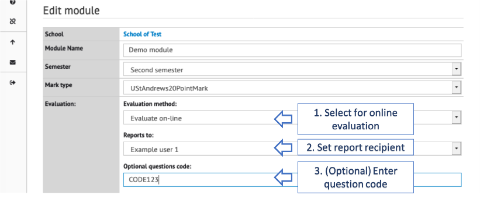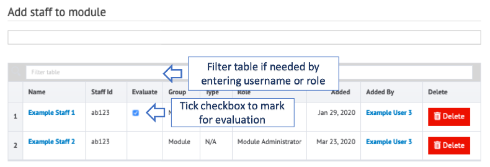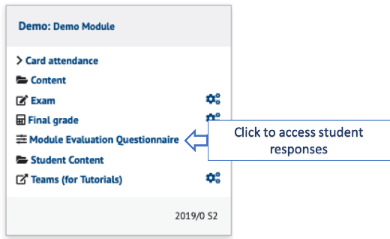Module Evaluation Configuration In MMS
Introduction
Module Evaluation Questionnaires (MEQs) allow students to feedback on their experience of a module and the staff teaching it. MEQs are run by Academic Monitoring and more in-depth information can be found here: https://www.st-andrews.ac.uk/education/staff/academic-monitoring/module-evaluation-questionnaires/
MEQ’s usually run towards the end of a taught module (for example December for Semester 1 modules), and take the form of an online anonymised questionnaire. Before the questionnaires are run, school staff can set a module to be evaluated, set which extra questions should be included, and which staff should be evaluated. When it comes to the evaluation period, students will then be able to access the questionnaires through links in MMS and MySaint, which will take the student through to the Questionnaire in Evasys.
Automated reminders are sent to the student throughout the evaluation period, and once it has closed, staff will be able to view a breakdown of the responses. Teaching staff will be able to view responses to module wide questions as well as questions relating to themselves. Coordinating staff will be able to view all responses.
MMS also provides a school level overview in the form of the Tartan Rug, which is only accessible to staff with roles such Head of School, or Director of Teaching.
This guide will cover:
- Setting up a module to be evaluated
- Setting staff to be Evaluated
- Linking students to MEQ’s
- Viewing MEQ responses
- Response options
Setting up a module to be evaluated
A module can be setup to be evaluated from the module overview by any unit or module administrator. Be default, when a module is set to be evaluated a questionnaire will contain a set of default questions. Additional questions can be added to the questionnaire by contacting academicmonitoring@st-andrews.ac.uk
To set a module to be evaluated:
- Access the Module Overview (see Figure 1 for links to the module overview in MMS and MySaint https://mysaint.st-andrews.ac.uk/).

Figure 1: Module overview links in MySaint (left) and MMS (right) - On the Module Overview, in the Edit Module section there is a table (see Figure 2). From the Evaluation row select the Evaluation method:
- Do not evaluate – this module will not be evaluated and a questionnaire will not be created
- Evaluate on-line – used for standard UG modules that need to be evaluated
- Evaluate online, Dissertation/Project module – used for dissertation/project modules that need to be evaluated
- Evaluate online, Group Dissertation/Project module – used for group dissertation/project modules that need to be evaluated.

Figure 2: To configure a module for evaluation select the 'Evaluate on-line' and the report recipient on the Module Overview.
- From the Reports to drop down list, select the primary module coordinator (this is required for Evasys but will not have an effect on the visibility of the responses in MMS).
- (Optional) If required enter the optional questions code (contact contacting academicmonitoring@st-andrews.ac.uk for the code if additional questions are needed)
- Scroll down and click the Save Changes button
Setting staff to be Evaluated
Staff with an academic role on a module can be set for evaluation. To set a member of staff to be evaluated:
- Access the Module Overview (see Figure 1)
- Select the Staff tab
- Locate the staff members to be evaluated - the table can be filtered using the Filter table functionality by typing in a user or role (see Figure 3). If the user is not appearing in the staff table, then they have not been added as staff. To add a user as staff on the module see https://www.st-andrews.ac.uk/mms-guides/staff-guides/qa/stafflists/question,244832,en.php
- Tick the checkbox in the Evaluate column ( a small dialogue box will appear on the screen indicting this was successful).

Figure 3: To mark a staff member to be evaluated tick the checkbox in the Evaluate column of the staff table.
Linking students to MEQ’s
Students will only be able to access MEQs while they are open (e.g. during the evaluation period), but they can do this in a number of ways:
- Clicking the Module Evaluation Questionnaire link under the module on the My Courses page in MySaint
- Clicking the Module Evaluation Questionnaire link under the module on the Modules page in MMS
- Clicking the link in the automatic reminder email they will receive (all students will get reminder emails as the MEQ’s are anonymous so MMS is unable to determine if a student has completed one or not).
While the questionnaire is open, the MEQ tool will also provide staff with a QR code they can download and add to PowerPoint presentations and handouts that will take students to the Questionnaire.
Viewing MEQ responses
Once the MEQs have closed (e.g. after the evaluation period) staff will be able to access the student responses. A guide on how to interpret the MEQ feedback can be found on the Support tab on the Module Evaluation Questionnaire. To view MEQ responses:
- Click the Module Evaluation Questionnaire link for a module in MySaint or on the Modules page in MMS (see Figure 4).

Figure 4: An example module as shown on the Modules page, with the MEQ link highlighted. - Adjust the view options check checking the required radio buttons (see Figure 5). An explanation of all possible options is given in the Response options section.

Figure 5: A screenshot of all possible view/response options available for the staff view of the MEQ tool. - Click the Change View button
Response options
An example of the response/view options available for MEQ staff view is given in Figure 5. Which options are available will depend on your role on the module and previously run modules, not all users will get the same options.
The available options are:
- Questions stats: This refers to the statistics associated with the question such as the number of responses, average response and the standard deviation in the responses
Options:- None: The numerical stats will not be displayed on the page
- Present: The numerical stats will be displayed under the graph (similar to a box and whisker plot).
- Staff: This allows the responses to be broken down by staff where appropriate. Note: This option is only available for coordinating staff. Staff with standard teaching roles (such as Lecturer or Tutor) will not be offered this option.
Options:- Separate entries: The responses will be broken down by staff member when the question asked about a particular member of staff.
- Combine by type: The responses relating to staff will be grouped by question.
- Free text Questions: Most of the questions asked as part of the MEQ can be responded to on a scale of 1-5, however some questions allow the students to type a response. As students are able to comment on any aspect relating the question, it is not possible to determine if the student is referring to a particular member of staff and in some cases default teaching roles are unable to view the free text responses.
Options:- Hide: The responses to the free text questions will be hidden.
- Show count: The responses to the free text questions are hidden, but the number of responses to the question will be noted.
- Show comments: The typed responses will be displayed, grouped by question. Note: For large modules this may significantly increase page size.
- Questions to include: In cases where the school has chosen to add additional questions to a questionnaire it is possible to view the responses to these questions, or just responses to the centrally defined (default) questions.
Options:- Centrally defined only (exclude school questions): Will display only the responses to the default questions
- All: Will display responses to all questions the user has access to, included any additional questions requested for the module.
- History: The MEQ tool will default to displaying the responses for a single module, however users with unit level oversight, or who have been coordinator on the module for a number of years, have the option to display the responses for previous instances of the module.
Options:- None: Only the responses for the current instance of the module will be displayed
- Three years: The responses for the instances of the module that have occurred for this academic year and the previous two will be displayed.
- Five years: The responses for the instances of the module that have occurred for this academic year and the previous four will be displayed. Note: This may take longer to load.
